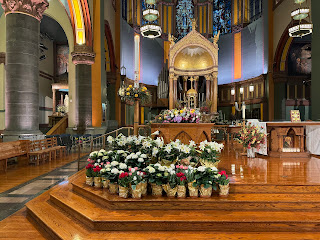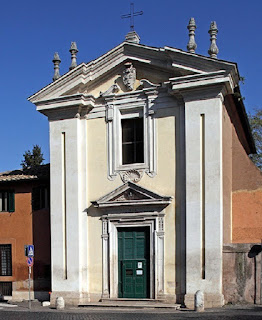One of the distinctive features of the Easter season is the daily reading of the Acts of the Apostles, which takes us back to the earliest Christian communities and their unique experience of the ongoing presence of the Risen Christ in their midst. Reading Acts, we get to experience vicariously the inspiring internal life of those apostolic Christian communities, living their own kingdom as a religious alternative to the empire in which they remained enmeshed.
I felt some of that inspiration during last month’s Paulist Summit on Polarization, ambitiously subtitled Bridging the Divide, Seeking Reconciliation. Participants included Paulists and Paulist Associates, academics, Catholic media figures, and others involved in various initiatives directly or indirectly aspiring to reduce the toxic affective polarization which is poisoning secular society and infecting even our life together as Church. The conference created opportunities for us to learn about how we experience one another and how to navigate through and around our differences, the obstacles which the ways we experience our differences create that hinder opportunities for conversation, and the human and religious resources we can draw upon to attempt those challenging conversations. The weekend was a powerful experience of Christian community, not unlike (it seemed to me) the communal reinforcement and encouragement those early Christians must have experienced in their local Churches.
Primarily, however, Acts recounts the Church’s growth and expansion from a small group huddled together in one room in Jerusalem to larger and increasingly more diverse communities throughout the Mediterranean world. It’s the wonderful story of how, transformed by the Risen Christ’s parting gift of the Holy Spirit into a missionary movement that spread from Jerusalem to Rome, the Church changed from a small Jewish sect into a world-wide Church with a universal mission.
To us, who already know the story, all that seems obvious and inevitable. For the first Christians, however, it must have seemed like one new learning experience after another. Today’s 1st reading [Acts 10: 25-26, 34-35, 44-48]recounts one pivotal point in that process. Peter, as the official leader of the community, had visited the disciples in a town called Joppa (near today’s Tel Aviv). While there, he had a dream of various animals and heard a voice tell him to eat them. When he responded that he had never eaten non-kosher meat, he was told, What God has made clean, you are not to call profane – another example of something the meaning of which may seem obvious to us, but which at the time must have seemed completely perplexing. Meanwhile, as Peter pondered this perplexing dream, emissaries from a Roman centurion, Cornelius, came and asked Peter to accompany them back to Caesarea, which he promptly did. That is where today’s reading picks up the story.
Cornelius was a Roman pagan, an uncircumcised Gentile! Normally, no devout Jew would enter his house, but these were not normal times. Already “prepped” by his perplexing dream, Peter crossed that boundary, and proclaimed the Good News of Jesus to a house full of Gentiles. Suddenly what had happened to the original disciples on Pentecost happened to Cornelius and his household – a “Pentecost for pagans,” as it has been called. So, Peter asked, “Can anyone withhold water for baptizing these people, who have received the Holy Spirit even as we have?”
Thus began the momentous change that enabled Christianity to spread throughout the wider world. I say “began,” because, of course, the full implications of something so unexpected took time to sink in. Had Cornelius become a Jew and then acknowledged Jesus as the Messiah, he would have been like the other early Christians, who were, of course, also Jews who acknowledged Jesus as the promised Messiah. Cornelius, however, did not become a Jew. He “jumped the line,” so to speak, directly into Christianity. Eventually, the Church would have to debate whether this was proper, and Peter would cite this transformational event as the key to understanding God’s will for his Church – that it be the vehicle for conversion and repentance for all, without exception and without restriction.
It was God who took the initiative in all this – directing Cornelius to invite Peter, prepping Peter with his dream, and then dramatically demonstrating God’s plan to include the Gentiles by giving them the Holy Spirit. For his part, Peter, as the official leader of the Church, recognized God’s action and accepted its implications, baptizing the first Gentile Christians and incorporating them into the community.
This story speaks volumes about the very nature of the Church – not just the first century Church of the apostles, but the global Church of the twenty-first century, which is, if anything, more diverse than ever before. The Church is not a club, a fraternal association, a social networking group, or even a prayer group, though it may have elements of all those things. As Pope Pius XI put it, almost a century ago: “The Church has no other reason for its existence than to extend over the earth the kingdom of Christ and so to render people sharers of his saving redemption.”
As a practical matter, of course, we experience the Church largely locally, as part of a locally defined parish community that nourishes and supports us in our faith. It brings us together to hear the Good News that makes our lives different from what they would otherwise have been. It brings us together to respond to that Good News with worship and prayer, support for one another, and service to others in the day-in, day-out dying and rising that defines a disciple’s life.
But it doesn’t stop there. In the movie Civil War, there is a strange interlude when the journalists drive through a town that seems to be pointedly ignoring the civil war being fought all around them, weirdly separated from the experiences and concerns of their fellow citizens. The Church does not enjoy that option, but rather has been appointed, as Jesus says in today’s Gospel [John 15:9-17] to go and bear fruit that will remain.
The parish is never just about itself, but in some sense is challenged take in the entire world, today’s world – to expand our horizon, just as the apostolic Church had its horizon expanded, to understand our own local experience of Church as one with that of the young, emerging Church in Africa, the aging Church in Europe, and the even more ancient Churches in India and the Middle East, along with newer Catholic Churches in Asia and elsewhere, to understand how our own middle-aged American Church is being rejuvenated and revitalized by many new immigrants, and in other unexpected ways, to understand our own local experience of Church in the wider terms of God’s great plan for the salvation of the world.
Homily for the Sixth Sunday of Easter, Saint Paul the Apostle Church, May 5, 2024.





